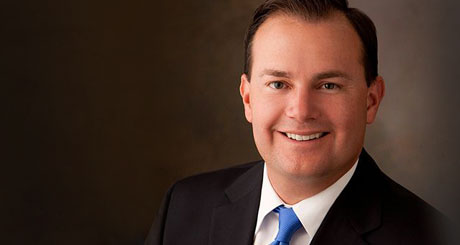Utah Sen. Mike Lee has tried to give this year’s legislative discussion on tax reform a family focus with a proposal to give all parents of underage children a $2,500 tax break per child, regardless of their income.
Unlike other proposed legislation, the tax reform is revolved around American families. Though the family unit is the building block to society, most laws passed by Congress are not family unit- centered.
Lee said the Family Fairness and Family Tax Reform Act would make the tax code simpler and relieve parents of what he calls the “parent tax penalty.”

“The current tax code singles out parents of young children for unfair and extremely expensive discrimination,” Lee said. “If there is any single group of people in the entire country whose equal opportunity to pursue happiness we should make sure to protect, it is our ultimate entrepreneurial and investor class: America’s moms and dads.”
But the tax reform is part of a bigger conversation. Recently other Republican congressmen have suggested tax reforms, priming a tax reform debate that could take place between Thanksgiving and the new year until fiscal cliff discussion begins.
The tax reform also addresses a topic nearly ignored in modern America; The birthrate is U.S. has slowed and could soon be too low to sustain the current population.
Lee’s new tax reform plan is the latest in a government attempts to encourage people to have children in the face of declining birthrates in developed nations, said Jonathan Last, author of “What to Expect When No One’s Expecting,” in his lecture for the Love and Fidelity Network Conference Nov. 9. He said it looked like a reasonable way to strengthen the middle class.
Lee said he is certain his tax reform will strengthen the middle class. He said the change in the tax code would benefit the American economy. His office predicts an expected revenue or 16–20 percent GDP.
“The family has emerged as perhaps the most important institution in our economy. It is an incubator of economic opportunity, an indicator of economic success, and grows more economically important every day.”
If the tax reform were passed into law, a married couple with two children making the median national income of $51,000 would see a tax cut of approximately $5,000 per year. Parents of children over 18 years would receive a tax deduction of $1,000 per child.
Lee’s proposal has won support from both sides of the aisle, perhaps because his proposal is considered fairly moderate for a conservative candidate. The tax reform seeks to end discrimination against low- to mid-income parents by taxing the rich more. Similar proposals are more often made by Senate Democrats.
The reform is supported by many moderate opinion commentators.
“Lee, the Utah conservative, announced an ambitious plan to reform taxes — the most attractive one we have heard from any Republican in a long time,” the National Review Editorial Board said in an online article.
Ramesh Ponnuru, columnist and editor for the National Review, said the reform has some force, but he critiqued the policy play.
“It has less force now that Lee, who is clearly a conservative, is shifting his party’s priorities on taxes towards the middle class,” Ponnuru said.
Jordan Lewis, human resources senior and expectant father, said he loosely supports the tax reform with a suspicious eye.
“It looks good to me, but I just have mixed feelings,” Lewis said. “I kind of approach any kind of reform with a little skepticism. On the surface it’s great, but (Lee) is trying to pitch this and say it’s good; but it’s a little ambiguous.”
The tax reform also includes a mortgage interest rate tax deduction capped at $300,000. Critics say the tax reform discriminates against those with high incomes.
“While this proposal would provide a substantial tax cut for middle income families with children, the elimination or modification of many itemized deductions for more affluent taxpayers with no children would result in increased taxation, particularly for those living in already high tax states such as New York, New Jersey and California,” said Rick Mayer, writer for the site How Money Walks.
Capping interest rate deductions at $300,000 also discriminates against those who live in high-cost housing areas, according to Mayer. He claimed imposing more taxes on high-income home owners makes the tax reform less likely to pass the Senate, since the reform would alienate a large donating portion of senators’ constituents.
The tax reform has not gone before vote in the House or Senate yet. Lee’s tax proposal may or may not be passed into law, but it is part of the tax reform conversation beginning in Washington, D.C.
“I wouldn’t imagine it passing,” Lewis said. “But look — a couple years down the road this could really benefit us. If not, we wouldn’t know the difference anyways.”




